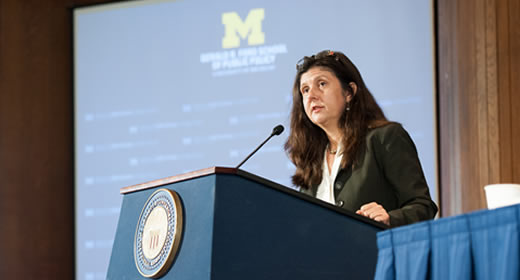
Ford School Professor Betsey Stevenson tackled misconceptions about the Federal Reserve in a “Five myths” Washington Post column, published August 2, titled “Five myths about the Federal Reserve.” In the wake of the Federal Reserve’s recent quarter-point drop of the benchmark interest rate and the stock market’s mixed reaction to the decision despite President Trump’s repeated calls that the bank make the move, Stevenson wrote that “the Fed’s role in the economy is shrouded in myths” and went on to identify five of the most prevalent.
Myth number one, according to Stevenson, is that the White House cannot influence monetary policy. “It’s true that the Fed is protected to an extent from politics…(but) the president picks the chairman and all the other governors of the Federal Reserve, and the Senate confirms them.”
The second myth Stevenson names is that the Fed isn’t audited. Stevenson points out that in fact the Fed’s financial activities, balance sheets, programs and operations are all heavily audited and proposed legislation to require further audits would “essentially give Congress the ability to change monetary policy.”
That low interest rates are always good for the economy is myth number three, where Professor Stevenson challenges sustainability: “Politicians often think too much about the short run and ignore long-term damage.” I
Included in that long-term damage, according to Stevenson is inflation, but in myth number four she explains that despite what many assert, the economy would not be better off with no inflation.
Stevenson writes myth number five is that inflation has become unrelated to unemployment. Though the correlation between low unemployment and higher inflation appears to have diminished over the past decade, Professor Stevenson observes: “When we look at the data, we are not seeing how inflation and unemployment move in response to market forces; instead, we are seeing the Fed actively trying to keep inflation near its 2 percent target. So the relationship now reflects the Fed either undershooting or overshooting its rate.”
Read the full piece on The Washington Post.
Betsey Stevenson is a professor of public policy and economics at the University of Michigan. She is also a faculty research associate at the National Bureau of Economic Research, a visiting associate professor of economics at the University of Sydney, a research fellow of the Centre for Economic Policy Research, a fellow of the Ifo Institute for Economic Research in Munich, and serves on the executive committee of the American Economic Association. She served as a member of the Council of Economic Advisers from 2013 to 2015 where she advised President Obama on social policy, labor market, and trade issues. She served as the chief economist of the U.S. Department of Labor from 2010 to 2011, advising the Secretary of Labor on labor policy and participating as the secretary’s deputy to the White House economic team.